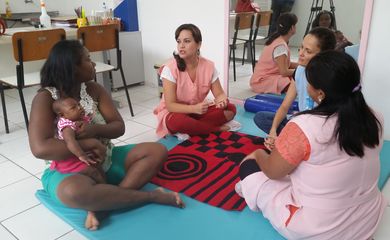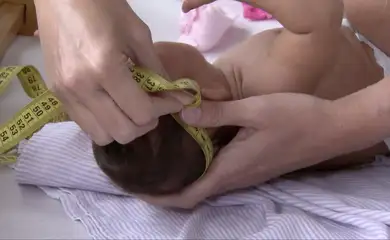Aggravating factors of microcephaly in poorest


Three times a week, Andreia de Andrade, 24, takes a transport in the town where she lives, Belo Jardim, and travels 185 km to Recife to make use of a health facility

Since investigations into suspected cases of babies with microcephaly were launched on October 22, 2015 until February 20, 5,640 cases have been reported, and 950 have been dismissed. In Pernambuco, the Brazilian state with the highest number of suspected cases, more than half of the babies come from low-income families.
A survey conducted earlier this month by the state department for Social Development, Child, and Youth reveals that out of the 1,203 suspected cases reported, 636 cases involved mothers who were members of the Single Registry of Social Programs, created to provide low-income people with access to public policies on income distribution. Out of this total, 77% are considered to be in extreme poverty, which means that they come from families earning a per capita income up to $19,69. According to the Health Ministry, the state currently investigates 1,601 suspected cases.
Agência Brasil's reporting staff in Pernambuco has witnessed the difficulties of those responsible for babies with microcephaly seeking services in the state, which was the first in the country to link the disease to the Zika virus.
Access to benefits
Three times a week, Andreia de Andrade, 24, takes a transport in the town where she lives, Belo Jardim, and travels 185 km to Recife to make use of a health facility in the state capital, where her son, João Lucas, 6 months, receives treatment for microcephaly. For each journey, she pays $25.05 to the driver. To help in the household bills, the young mother tries to join the federal government's Continuous Cash Benefit (BPC) program, but she has to wait for months to be received by the National Institute of Social Security (INSS).
"Soon after he was born, I asked to join the program. The appointment with the Social Security expert was scheduled for soon after Carnival, February 11. When I arrived at the agency in my city, they told me there was no doctor with microcephaly expertise. Therefore, they could not serve me. They rescheduled it for April 4," reported Andreia. "I think that if they have no expert there, they should send me somewhere else," she added.
The benefit, worth a minimum wage ($220.48), is entitled to low-income people of any age, living with long-term disabilities, whether mental or physical, and is independent of previous contributions to the social security system. For the moment, Andreia has only her husband's minimum wage to pay for monthly expenses. She was a seller, but left the job when she was pregnant. "My boss said that the job was mine whenever I wanted. But I cannot go back to work now. Who will look after my son?" she questioned.
Since expenses already exceed revenues, Andreia reports that they are only able to pay for the journeys with the relatives' financial help. There is no vacancy for the city's free transport, according to the former saleswoman. "I'm waiting. I cannot miss the appointments, so I have to find a way to bring him [to Recife]. The baby cannot be left without health care," she said. In the town where she lives, they only have follow-up services with speech-language therapist and physiotherapist.
Long wait for INSS
According to Rolnei Tosi, INSS superintendent in the Northeast, there is no need to hire an expert in microcephaly to examine babies with brain malformation. "I have not received any case in which the physician had refused to see the patient. If they already come with a medical report, with all the documents diagnosing the baby with microcephaly, they shall be considered disabled, and are eligible for the benefit. "
The superintendent reported that he will request the municipal agency information about the reasons for rescheduling it, because, according to him, they could not lack the service due to the lack of professionals and, if necessary, Andreia could schedule an appointment with a clinical expert from another town, with shorter wait.
Nevertheless, the case of the Belo Jardim resident is not the only one: there is a long wait for seeing an expert. One reason is the high number of procedures not performed in the past few months due to the medical experts' strike, which lasted more than five months and ended on February 22.
"We are making a joint effort to satisfy the demand. Experts are receiving three or four more people than usual. Some agencies are organizing a joint effort during the weekend just with medical experts, and the idea is to schedule microcephaly cases in these extra appointments. We are requesting the servants to identify these cases to make the best out of the joint efforts," explained the INSS superintendent.
Sharing experiences
To tackle issues like the lack of transport and structure for treating babies with microcephaly, to clear up some doubts and even to offer mutual emotional support, these children's mothers are organizing themselves into groups and meetings.
In Belo Jardim, Andreia has brought 13 women together. They are all facing the same challenge. "When I found out that my son had microcephaly, I posted a message on the city's group of mothers on Facebook, asking if there was anyone in the same situation. Then they began to come up to me," reports the young woman.
They communicate by a Whatsapp group, and they already held the first face-to-face meeting at the end of January—"to introduce the babies," Andreia said with a smile. But the meeting are not only to strengthen emotional ties. They are also discussing, for example, the lack of free transport provided by the municipality to take the babies to medical appointments in Recife. "We are planning to go to the city hall together and inform ourselves about how they can help us," she declared.
Aunt Ângela
Concerning public transport, Ângela Maria da Silva, 45, has been luckier. A car from the city hall of Recife picks her and her adopted daughter Lívia Vitória up and takes them back home.
The 3-month baby, Lívia Vitória, was diagnosed with microcephaly and left by her mother and father when she was just a newborn. Thanks to aunt Ângela, the girl will have a chance to be raised in a home and receive love.
"The mother is a drug user. She had a daughter, but did not want to look after her. The judge asked us to look for someone wanting her. Then I saw Lívia suffering and I decided to informally adopt her," told Ângela the story about the girl's adoption, which has not been formalized yet.
Agência Brasil's reporting staff found both of them at Oswaldo Cruz Hospital, in Recife, where the baby's biological material has been collected to investigate the link between the disease and the Zika virus.
Ângela is the child's biological aunt. According to her, her brother cannot afford a baby.
Resident of São Vicente Férrer, 120 km away from Recife, Ângela left home at 3 am holding Lívia to go to the doctor's appointment. She arrived at the hospital at 5:30 am. Patients are seen in the order of arrival, beginning at 7:30 am. She and little Lívia only left the hospital at 11am.
"In São Vicente Férrer, she is accompanied by a nurse, who measures her, but she receives all the treatment here. I think it's good because here they have more resources for her treatment, isn't it?" she analyzed.
At Lívia Vitória's age, it is not possible to determine which will be her physical and psychological imparments, but her adoptive mother has noted some differences from babies at the same age. "She cries a lot, shakes her head a lot, whines a lot. At some nights, she does not sleep. She does not move her legs," she lists, noting that the microcephaly diagnosis was a surprise, since the biological mother did not take prenatal care.
Ângela's family does not earn a high income. Nevertheless, when asked about how she feels about the adopted child, who will need a lot of health care, she calmly said: "I feel very moved. I was not afraid, because she was suffering and I really wanted to help. All I want is her health. I have had no regret over [the decision of] looking after her. I would do it all over again. "
Translated by Amarílis Anchieta
Fonte: Aggravating factors of microcephaly in poorest



